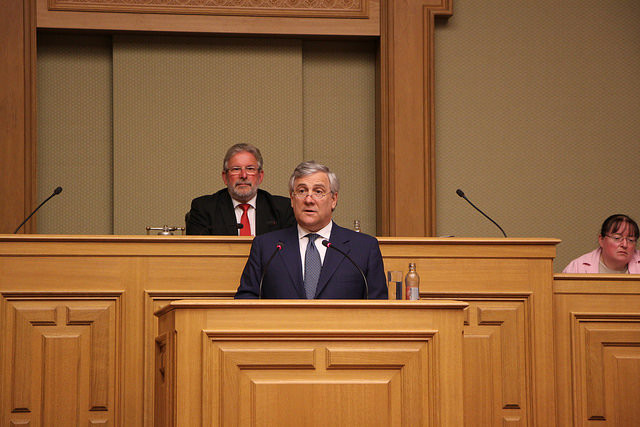He said that his objective was to reconnect the EU with its citizens, through three priorities: to complete the Single Market, create a coherent industrial policy and increase transparency.
Luxembourg against Eurozone parliament
Marc Angel, MP for the LSAP, asked the president’s position on creating a Eurozone parliament.
Tajani said that such a parliament could be part of a politicisation of the monetary union. But he also said that as EP president, he could not accept another European parliament. Establishing special working groups or committees was another thing, according to Tajani, but he was categorically against another parliament.
Multispeed Europe
Claude Wiseler, leader of the CSV parliamentary group, asked a question on multi-speed Europe, and in which policy areas this might be possible, apart from defence. He also wanted to know which policies should be prioritised, especially for young people.
The EP president said he wanted a more political and courageous EU, especially in areas such as migration. The latest elections in several European countries indicate a wish to change the EU. He shared European commission president Juncker’s vision that the EU should focus on the bigger things, not details. It was not a competition between nation states and the EU. The EU should be a real political power. In order to protect EU citizens, the EU has to deal with the migration crisis, with the crisis in the Balkans, which the EP president called a powder keg, and Europe should not rely on the US anymore.
Tajani stated he was not against a two-speed Europe. The member states who were willing and able to move forward, such as Germany, France, Spain and Italy (but also Luxembourg), but they should help the others who do not have such favourable political, social and economic environments. They should help others to follow the line, not leave them behind. In that way, a two-speed Europe was a positive development.
The problems of the banking and of the financial union must be solved.
Defending European SMEs and industry does not mean protectionism, but it means defending employment, our identity, said Tajani. While services are important, one should not forget the real economy.
What about British MPs?
Eugène Berger, leader of the liberal party’s parliamentary group, asked about how Brexit would influence the 2019 EP elections, as Britain would still be a member and financially involved in the EU.
Tajani said: “We want to defend European citizens’ rights in the UK, and if these were not guaranteed, the EP would vote against any agreement between the EU and the UK. There are currently 73 British MPs; they stay involved in the parliament’s work but not in the work on the committees which deal with the EP’s position on Brexit.” Tajani expected a framework agreement by the end of 2018, but that the British government was much weakened. However, Tajani did not go into details on how Brexit would influence the EP elections.
Reluctance on changing treaties
Fernand Kartheiser, MP for the ADR, wondered whether the reluctance of the EU to conduct referendums and push EU integration without treaty changes which require the approval of national parliaments and sometimes citizens, was the right way forward.
Tajani answered that the recent elections meant that we had to change the EU, but that representative democracies should not use excessively referenda to do politics.
New EU budget negotiations
Claude Adam, MP for the Greens, wanted to find out more about the preparations on Tajani’s proposals to reform the multiannual framework of the EU budget. According to Politico, these would include reducing the multiannual framework to 5 years to align it with the legislative period, and to redistribute the allocations away from the common agricultural policy (CAP). Adam asked Tajani how the CAP would be reformed and whether environmental standards would be included in the criteria.
Tajani said that the article didn’t have a single quote from him. However, he confirmed he wanted the budget to coincide with the legislative period. He said that he was not responsible for deciding spending priorities, and had not mentioned agriculture. He said agriculture was part of the real economy, and said investments had to be made into research, innovation and competitiveness. A strategy was needed.
Bringing the EU closer to citizens
Marc Baum from déi Lénk, wanted to know which initiatives the president wanted to take to bring the EU closer to the citizens.
Tajani said the EP should become more of a protagonist, and that he has and will organise conferences with citizens to engage more. He stated that he has taken measures to increase transparency of MP’s remunerations. Tajani regretted that out of 3 invitations, the president of the Eurogroup only came once to talk to the European parliament. He said he was in favour of more transparency in these matters.
